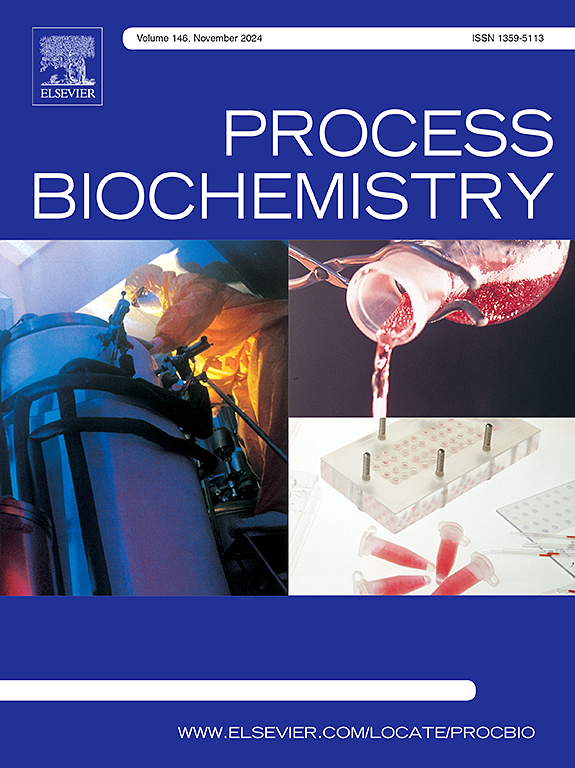Enhancing riboflavin production by modulating the expression of the rib operon in Bacillus subtilis
IF 3.7
3区 生物学
Q2 BIOCHEMISTRY & MOLECULAR BIOLOGY
引用次数: 0
Abstract
Riboflavin is an essential vitamin for humans and animals, with its annual demand experiencing a consistent upward trajectory. In recent years, newly constructed riboflavin producing strains are difficult to reach the level of industrial strains. Therefore, developing competitive strains is crucial for advancing the riboflavin industry. The expression level of the rib operon is strongly correlated with riboflavin biosynthesis. The strain S12, which overexpressed the rib operon of B. subtilis using plasmids with approximately 8 copies, achieved a 53.9 % increase in riboflavin biosynthesis during shake-flask fermentation. However, the strain cannot grow normally in a 7.5-L bioreactor. The expression of rib operon may have competed with cell growth for GTP or produced toxic intermediate ArP. Therefore, the strain S16 replaced ribA in rib operon with a monofunctional DHBP synthase, increased 20 % of riboflavicn production in a 7.5-L bioreactor. Furthermore, the strain S24, which overexpressed the rib operon using the phase-dependent promoter PyqgZ, attained a riboflavin production of 29 g/L in a 7.5-L bioreactor, achieving the highest reported riboflavin production to date. This study reports for the first time using the phase-dependent promoter for overexpression of rib operon, effectively regulated the relationship between cell growth and riboflavin production.
通过调节枯草芽孢杆菌核糖操作子的表达提高核黄素产量
核黄素是人类和动物必需的维生素,每年的需求量呈持续上升趋势。近年来,新建的核黄素生产菌株很难达到工业化菌株的水平。因此,开发具有竞争力的菌株对于推动核黄素产业的发展至关重要。核糖操作子的表达水平与核黄素的生物合成密切相关。利用约 8 个拷贝的质粒过量表达枯草芽孢杆菌核糖操作子的菌株 S12,在摇瓶发酵过程中核黄素生物合成量增加了 53.9%。然而,该菌株无法在 7.5 升生物反应器中正常生长。核糖操作子的表达可能与细胞生长竞争 GTP 或产生有毒的中间产物 ArP。因此,菌株 S16 用单功能 DHBP 合成酶取代了核糖操作子中的核糖 A,使 7.5 升生物反应器中核黄素的产量提高了 20%。此外,利用相依赖启动子 PyqgZ 过表达核糖操作子的菌株 S24 在 7.5 升生物反应器中的核黄素产量达到了 29 克/升,实现了迄今为止报道的最高核黄素产量。该研究首次报道了利用相位依赖性启动子过量表达核糖操作子,有效调节了细胞生长与核黄素产量之间的关系。
本文章由计算机程序翻译,如有差异,请以英文原文为准。
求助全文
约1分钟内获得全文
求助全文
来源期刊

Process Biochemistry
生物-工程:化工
CiteScore
8.30
自引率
4.50%
发文量
374
审稿时长
53 days
期刊介绍:
Process Biochemistry is an application-orientated research journal devoted to reporting advances with originality and novelty, in the science and technology of the processes involving bioactive molecules and living organisms. These processes concern the production of useful metabolites or materials, or the removal of toxic compounds using tools and methods of current biology and engineering. Its main areas of interest include novel bioprocesses and enabling technologies (such as nanobiotechnology, tissue engineering, directed evolution, metabolic engineering, systems biology, and synthetic biology) applicable in food (nutraceutical), healthcare (medical, pharmaceutical, cosmetic), energy (biofuels), environmental, and biorefinery industries and their underlying biological and engineering principles.
 求助内容:
求助内容: 应助结果提醒方式:
应助结果提醒方式:


